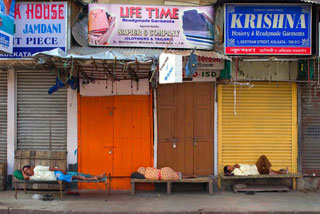The streets of Kolkata normally teem with people, shoulder to shoulder, in a
dense miasma. Think of a population of 15 million—the sights, sounds,
smells—chock-a-block. It's chaos.
That is, until a bandh.
A bandh is a widespread general strike, the city's political answer to protest.
It happens every now and then, with political parties calling all workers, and
all work, to stop for a day or two or more. The goal: grind life to a halt to
stymie business and normal life.

Men sleep in front of closed shop stalls.
A bandh happened recently in response to a prickly and complex struggle
south of Kolkata over villagers' land rights, and riots turned bloody.
During the bandh, this frenetic city was transformed into a ghost town. Only a
handful of "necessary" businesses were allowed to stay open.
Thankfully those included a few tourist-oriented food stalls, an Internet shop,
a bank and a hotel bar. Some other businesses remained open, but barely. Some
kept their roll-down metal open a few feet off the ground—just enough room for
customers to squeeze in and out.
Fresh & Juicy, a popular five-table restaurant with no kitchen (orders are
sent out for preparation), opened for breakfast. I asked the manager whether it
was a problem for him to conduct business that day. "No, not a
problem," he said. "Because I know everybody." Still, he sat
outside the shop, eyeing the street. He looked concerned.
With buses, trains, taxis and virtually all transportation stalled, few
employees showed up for work at offices that opened in the technology sector.
The city's primary streets had a post-war look to them. Kids played cricket in
the middle of the roads.



 Pinterest
Pinterest


